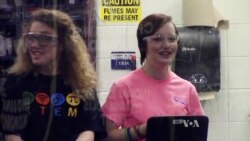Girls and robots go together like ... boys and robots. That's obvious, if you check in with any high school robotics club.
But you will usually find many more boys in these clubs than girls, and that imbalance continues into college and beyond. Despite making up half of the world's overall workforce, women hold only a quarter of the jobs in science, technology, engineering and math, and the number of women employed in computer fields has dropped since 1990.
Cyber Blue, the robotics club at Perry Meridian High School in Indianapolis, Indiana, is working to change that by creating a robotics competition that puts girls in charge.
Taking the lead
At the Indianapolis Robotics All Girls Event, or IndyRAGE, girls, like senior Elizabeth Bremer, took the lead — designing, programming, building and operating the robots — while the male club members stayed behind the scenes.
"We started this because we thought it was important that girls got into it," Bremer said. "Not that they can't when boys are there, but some maybe feel like they can't step up when the guys are doing things."
That made things more comfortable for sophomore Alivia Shake.
"I felt a lot more stress taken off of me because I was with the girls and they weren't pressuring me as much as the guys," she said.
The goal in the IndyRAGE competition was for robots to pick up and deliver objects to a specific area to score points, while other robots tried to block them.
Cyber Blue first competed in an all-girls event last year in Michigan and did quite well. It was a learning experience, according to sophomore Rayven Blakey.
"You get to see other teams' robots,” she said. “You get to see how they do what they do and get ideas, like 'Oh, we could have done that' or 'We can make this better by doing this.’ "
She thinks her team's success at that event may be one reason the number of girls in Cyber Blue nearly doubled this year, from 7 to 13.
Lessons in computing, careers
Like many high school robotics clubs, the 45 team members work in a studio that's part machine shop, part dueling arena.
Their lead mentor, Chris Fultz, a systems engineer at Rolls Royce, says the whole point of clubs like Cyber Blue is to get students excited about science and technology, and thinking about jobs in the field. To help them do that, students go through a rigorous process to join the club — filling out an application, creating a resume and being interviewed.
"We run like a small business," Fultz explained. "Every year they [have to] apply, both the students that are returning and new. Several students have told us that after the robotics interviews, their first job interview was a breeze."
Junior Katie Boyce says she wanted nothing to do with the robotics team when she first heard about it, until she realized that there were subteams doing design, electronics, programming, and public relations.
"I thought, 'Engineering, who cares?' " she recalled. "My first year I got here and was like, 'Oh there's other stuff I can do. It's not just about the robot!' "
Thanks to Cyber Blue, Katie now knows she wants to go into public relations, while Alivia wants to work on rocket engines for NASA, Rayven is interested in designing cars, and Elizabeth is considering a career as an engineer.
The co-ed teams are training for the regular robotics season early next year. If all goes well, Cyber Blue hopes to make the world championships in St. Louis this spring.





